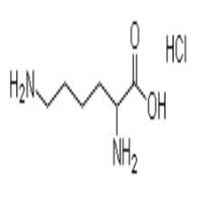Synonyms
lysine, monohydrochloride
Z4YZVQ &&HCl
MFCD00064563
(2S)-2,6-Diaminohexanoic acid monohydrochloride
DL-Lysine hydrochloride (VAN)
L-Lysine, monohydrochloride
2,6-diaminohexanoic acid,hydrochloride
Lysine hydrochloride
L-Lysine HCl
Lysine, hydrochloride (1:1)
Lysine hydrochloride (1:1)
2,6-diaminohexanoic acid hydrochloride
Product Description
DL-Lysine hydrochloride is a widely used amino acid that is important for protein synthesis and plays a
critical role in many physiological processes in the body. It is an essential nutrient that cannot be
produced by the body and must be obtained through the diet or dietary supplements.
As a chemical product, DL-Lysine hydrochloride is used in a variety of industrial applications,
including the production of animal feed, pharmaceuticals, and personal care products. It is also used as
a component in the manufacture of polymers, resins, and other industrial materials.
In the food industry, DL-Lysine hydrochloride is used as a food additive and dietary supplement. It is
commonly used in the production of animal feed and is added to poultry and swine diets to improve growth
rates and feed efficiency. It is also used as a dietary supplement for humans, particularly for athletes
and bodybuilders who are looking to support muscle growth and recovery.
When used as a food additive, DL-Lysine hydrochloride must meet strict purity and safety standards to
ensure that it is safe for human and animal consumption. It is typically produced through fermentation
of natural sources, such as corn, wheat, and soy.
The benefits of using DL-Lysine hydrochloride as a dietary supplement and food additive include its
ability to support muscle growth and recovery, improve growth rates and feed efficiency in animals, and
potentially improve immune function. DL-Lysine hydrochloride has also been shown to support healthy skin
and may have anti-inflammatory properties.
However, as with any dietary supplement or food additive, it is important to use DL-Lysine hydrochloride
in moderation and under the guidance of a healthcare professional. Overuse of DL-Lysine hydrochloride or
consumption of high doses can lead to adverse health effects.
Overall, DL-Lysine hydrochloride is an important and versatile ingredient in both the chemical and food
industries. Its ability to support muscle growth and recovery, improve growth rates and feed efficiency
in animals, and potentially improve immune function make it a valuable addition to many different types
of products, from animal feed to dietary supplements and food additives.





